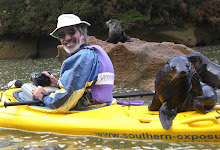So, in that light, I've been thinking about how I ought to write and publish a book for reporters listing all the (few) things they should know how to do with numbers.
I can see a small, fit in your pocked, type book that's easy, fun, and lists the kinds of things a reporter should be able to do if a story has numbers in it. Sorta of like a reporter's notebook, but loaded with how to do things with numbers.
There are things that (most of us) reporters just don't get. For example: Don't you think it's strange that 750 is 50 percent more than 500 but 500 is only 33% less than 750? And what really is the difference between mean and median and when, from a journalistic point of view, is it best (and most ethical) to use which?
As I mentioned in the last post, the Poynter Institute's very good News University offers a free online course covering math for journalists. I have had a chance to look it over and it covers some important material, but if you're anything like me, you'll be able to get through the exercises, but will forget the stuff after about 10 minutes. I need something with me and I imagine that other people might also.
Here are three books I found that seem to be on target:
Math Tools for Journalists
A Mathematician Reads the Newspaper
How to Lie With Statistics
I ordered them from Amazon
Wickham's book seems like she might have done what I want to do. If she did, great. I've got other things on my list. However, the book "weighs in" at 188 pages. Not having seen it, I suspect it might be a little more that what most journalists have the attention span to deal with. A sophomore in a one-unit semester long course, perhaps, but not a working journalist, or for that matter, a 21 year old senior. I've tried it.
So I'm thinking of titles. That's the easy and fun part, isn't it? If you have ideas, send them my way, unless you have big plans yourself.
What I like so far are:
Reporter's Math Book
The Reporter's (minimal) Math Book
Reporter's Notebook:
The Least You Need to Know (about math)
And, I'm already thinking about a table of contents.
Here are what seem like obvious topics.
Definitions
Stats
Average
Mean
Median
Mode
Percent Higher
Percent Lower
Pie Chart
Bar Chart
Debits
Credits
Balance Sheet
ROI (return on investment)
P&L (profit and loss)
Simple Interest
Compound Interest
Probability (Chances are, the chances are...)
Tools
Spreadsheets
Relational Data Bases
Ratios
Percentiles
Metric conversion
Currency conversion
Understanding surveys
Margin of Error
Sample
Confidence Interval
Standard deviation
Percent vs. points
I wonder if I'm already getting into more than a good word-loving journalist would even want to know is there, much less know how to do.
I've bounced the idea off of several friends -- all folks in the field (of journalism, not math) and have had both enthusiastic and guarded responses. I'll write about them next time.
